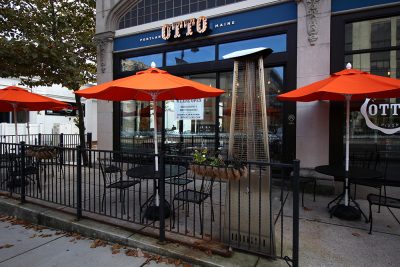Massachusetts restaurants are bracing for lost revenue as colder temperatures threaten the feasibility of outdoor dining, a saving grace for many as the pandemic limits indoor seating capacities.

The state’s restaurant industry has struggled since the onset of the pandemic in March, with roughly one-fifth of restaurants having permanently closed.
Steve Clark, vice president of government affairs at the Massachusetts Restaurant Association, said holiday bookings and increased demand for catering usually boost revenues around the end of the year. He said this tends to balance a revenue dip after New Year’s Day.
However, many restaurants are choosing to take the typically busy season off this year because of waning revenues, according to Clark.
“You’re seeing a new trend now of restaurants that are ‘hibernating’ for the winter,” Clark said, “which is a fancy way of saying they’ll be closing with the intention of reopening.”
While restaurants in tourism-heavy parts of the state close seasonally, those in the Boston area typically operate year-round, Clark said.
“Traditionally, a lot of restaurants on the Cape hibernate anyway during the off-season,” Clark said. “But, with restaurants saying, ‘We’re going to close in Boston and reopen,’ this is the first time that that’s been happening.”
Although “hibernating” will help restaurants reduce variable costs like staffing and food supply, Clark added that operators will still need to pay rent and building insurance.
Prior to COVID-19, rents were typically based on a restaurant’s sales, said Andy Husbands, a Boston-based restaurateur. Landlords have no obligation to renegotiate contracts after signing, Husbands said, but some restaurant owners were able to modify or abridge their contracts when the pandemic hit, easing financial pressures.
All three of Husbands’ The Smoke Shop BBQ restaurants temporarily expanded their patio seating this summer, either into public space allocated by the City or additional space granted by landlords, he said.
As temperatures begin to drop, Husbands said he is planning to eliminate outdoor seating to maintain guests’ comfort. He added that accommodations such as heaters, which are popular among restaurants seeking to continue outdoor dining, are not effective enough to combat winter weather.
“They work good for a chilly night with a little fall crisp air, but they don’t really work,” Husbands said. “They’re not worth the expense that you need to really extend patio dining.”
Husbands added that customers appear comfortable with indoor dining, especially as restaurants implement improved sanitation and separation protocols.
Clark said decreases in demand for indoor dining are less related to customer attitudes than to capacity limits and the addition of new outdoor options.
Restaurants were previously permitted to offer outdoor seating until Nov. 1, but Boston has extended its outdoor dining season until Dec. 1.
With this new flexibility, some restaurants with private patios plan to continue offering outdoor dining throughout the winter.
Mark Standish, owner of the Bowery Bar in Dorchester, said his restaurant is putting up heated yurts and inflatable igloos to maintain patio dining throughout the winter.
“It is private dining out there, because it’s individual yurts,” Standish said. “So I do think there’ll be a high demand for them.”
Standish added that the Bowery has experience with winter outdoor seating from having set up its yurts last year.
Other restaurants, like the Deluxe Town Diner in Watertown, are unable to make the necessary accommodations for comfortable outdoor dining after months of low revenue.
“We would like to build up an enclosure, but we don’t have the money or business to do that right now,” owner Don Levy said.
Levy said the diner’s business has been hurt by the loss of college students and regulars who are concerned about their health. He added that the diner plans to halt outdoor seating when temperatures begin to drop, although he does not have a specific date in mind.
“The governor said we can stay open until December, but I don’t see people eating out there too much,” Levy said. “Food gets cold. It’s cold.”






























































































































